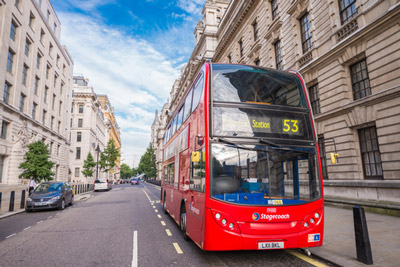One third of London buses to run on biodiesel from waste products
- Like
- Digg
- Del
- Tumblr
- VKontakte
- Buffer
- Love This
- Odnoklassniki
- Meneame
- Blogger
- Amazon
- Yahoo Mail
- Gmail
- AOL
- Newsvine
- HackerNews
- Evernote
- MySpace
- Mail.ru
- Viadeo
- Line
- Comments
- Yummly
- SMS
- Viber
- Telegram
- Subscribe
- Skype
- Facebook Messenger
- Kakao
- LiveJournal
- Yammer
- Edgar
- Fintel
- Mix
- Instapaper
- Copy Link
Posted: 22 December 2015 | Katie Sadler, Digital Content Producer, Intelligent Transport | No comments yet
Approximately a third of all London buses will soon operate using biodiesel from waste fats and oils cutting CO2 emissions by 21,000 tonnes each year. Stagecoach and Metroline have signed a contract with Argent Energy to supply the operators with B20 green diesel. The cleaner burning fuel is made from blending diesel with renewable biodiesel […]


Approximately a third of all London buses will soon operate using biodiesel from waste fats and oils cutting CO2 emissions by 21,000 tonnes each year.


Stagecoach and Metroline have signed a contract with Argent Energy to supply the operators with B20 green diesel. The cleaner burning fuel is made from blending diesel with renewable biodiesel from waste products, including cooking oil and tallow from the meat processing trade. It is hoped the conversion will cut CO2 emissions from each bus by more than 10 percent, adding to the 48,000 tonne reduction in CO2 since 2013 thanks to the introduction of lower emitting buses such as hybrids.
CO2 emissions from each bus will fall by more than 10 percent
Transport for London (TfL) predicts 3,000 of the capitals 8,900 buses will be powered by the B20 fuel blend by March 2016. Stagecoach has already been trialling B20 on 642 of its buses for two months.
Deputy Mayor for Environment and Energy, Matthew Pencharz, said: “Just a fortnight after the Mayor’s visit to the Paris conference on preventing global warming, I am very pleased to announce that nearly a third of London’s buses will now be running on biodiesel, slashing the overall carbon emissions of the fleet and making use of fuels that would otherwise be clogging up our drains. These buses will be a proud addition to what is already the greenest bus fleet in the world, including hybrid, pure electric and pure hydrogen vehicles.
“This is ongoing progress for running our bus fleets on waste products and cutting CO2. We will continue to work with our industry partners to use more of London’s used cooking oil turned into biodiesel right here in the city, creating green jobs and fuel self-sufficiency benefits.”
Mike Weston, TfL’s Director of Buses, said: “Our bus fleet is now making a major contribution to improving air quality and bringing down CO2 emissions. This improvement, which will reduce CO2 emissions by 21,000 tonnes each year, is being introduced now with no extra spend needed and no long delay for the fitting of new kit. It’s just one of a number of measures we are taking to make London’s environment better for everyone.”
London buses use around 240 million litres of fuel each year
Dickon Posnett, Development Director of Argent Energy, said: “The ever-growing demand to reduce greenhouse gases from transport is well recognised. TfL and the Greater London Authority have actually done the research and have now shown they have the understanding of the immediate benefits that high bio-blend diesel can bring.
“They and London bus companies are leading the way in using this economic and simple option that can produce significant greenhouse gas reductions from bus fleets, here and now. The good example set here can only help to inform other UK cities that are also looking to make greenhouse gas savings.”
London buses currently use around 240 million litres of fuel each year. Under the new deal, about 80 million litres of the new greener blend of fuel per year will be consumed, producing 10 percent less ‘well to wheel’ carbon emissions than a bus using ordinary diesel.
According to TfL, the Capital’s bus fleet already has over 1,500 hybrid electric buses and 15 pure electric buses. Over 2,000 older buses have been retrofitted with Selective Catalytic Reduction, reducing their NOx emissions by up to 88 percent per bus. The number of hybrid buses will increase to over 1,700 by 2016 – a figure that will represent over 20 percent of the fleet
Related modes
Bus & Coach
Related cities
London, United Kingdom
Related organisations
Stagecoach Group, Transport for London (TfL)



